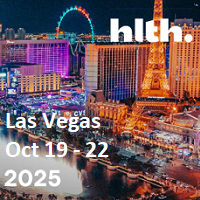HLTH 2025
 When: October 19-22, 2025
When: October 19-22, 2025
Where: The Venetian Expo Center, Las Vegas NV
Event Page
Event Agenda
Hashtag: #HLTHUSA
Are you attending hlth this month? What will you be looking for? What trends will you be expecting? Check out what these attendee will be looking for and keep your eyes out for them. It is all about networking.
 David Bates, PhD, CEO and Co-Founder, Linus Health
David Bates, PhD, CEO and Co-Founder, Linus Health
I expect to see a sharper focus on how AI can become the backbone of a new standard of care. The healthcare industry is at a tipping point where prevention and early detection can finally be prioritized alongside treatment. If we seize this moment, we can reshape patient outcomes, as well as how health systems, payers, and life sciences align around value. The window to set that standard is open, but it will not stay open for long.
 Lathe Bigler, General Manager, FDB Vela
Lathe Bigler, General Manager, FDB Vela
We will see an increased emphasis on redundancy in healthcare infrastructure. The last year has shown how fragile critical systems can be when they rely solely on a single network or vendor. In areas like ePrescribing, where nearly 5 billion prescriptions flow annually, even a brief outage can disrupt patient care on a massive scale. Discussions at HLTH will highlight the importance of building resilient, redundant networks. Such networks can withstand cyberattacks, outages, or unexpected spikes in demand, because continuity of access to medications is not optional, it is fundamental to patient safety.
 Fawad Butt, President, Penguin Ai
Fawad Butt, President, Penguin Ai
I’m excited to see governance getting the spotlight, because it’s going to become its own specialty in healthcare AI. In practice, governance means guardrails around how AI is built and used safely—from data selection and de-identification to model training, monitoring, validation, and bias mitigation. For payers and providers, the challenge will be building cross-functional frameworks that balance innovation with risk, a tension that will define the next wave of agentic healthcare.
 Gautam Char, Chief Strategy Officer, Omega Healthcare
Gautam Char, Chief Strategy Officer, Omega Healthcare
Healthcare providers are navigating mounting pressures–from increased regulatory complexity and patient financial responsibility to shrinking margins and staffing shortages. At HLTH, there will be a focus on how to empower healthcare leaders to address these challenges by planning for and investing in technology and strategic partnerships that advance automation and AI–from generative to agentic–while strategically keeping humans in the loop at the right moments to deliver transformative outcomes.
 Michael Dalton, CEO and Founder, Ovatient
Michael Dalton, CEO and Founder, Ovatient
I am watching closely what Epic and Microsoft are doing together in their partnership built around AI. The focus will in turn be on how to incorporate the tools they are building into virtual-first care delivery and operations models. Bottom line–we believe having an AI strategy is table stakes and the investments and expertise of two industry leaders should be leveraged for the benefit of patients and healthcare organizations, rather than trying to reinvent the wheel.
 Kent Dicks, CEO, Life365
Kent Dicks, CEO, Life365
Virtual-first tools and AI will be top of mind at HLTH 2025. The need for such tools is greatest in chronic care management to address diabetes, hypertension, COPD, obesity, and heart failure, which drive massive costs, especially among older populations and Veterans. With fewer doctors available, AI and virtual-first tools must step in to detect trends early, nudge patients toward compliance, and empower caregivers to intervene before conditions become more costly and critical.
 Anna Dover, PharmD, BCPS, Senior Director, Editorial Content, FDB (First Databank, Inc.)
Anna Dover, PharmD, BCPS, Senior Director, Editorial Content, FDB (First Databank, Inc.)
I’m looking forward to seeing more about how clinical decision support is evolving into a true partner in care. Instead of overwhelming clinicians with alerts, newer CDS tools surface the most meaningful insights at the right moment. By drawing on richer patient data—labs, treatment history, and more—these tools deliver precise, personalized guidance that feels natural, not intrusive. The result: greater clinician confidence, reduced burden, and better outcomes for patients.
 Brian Drozdowicz, Chief Revenue Officer, PointClickCare
Brian Drozdowicz, Chief Revenue Officer, PointClickCare
I believe we will see a turning point where value-based care and intelligent technology finally converge to redefine how patients navigate the healthcare system. The future lies in connected ecosystems that unite acute care providers, post-acute partners, and health plans with AI-powered insights that anticipate risk and drive seamless transitions. What excites me most is how this shift will prove that high-quality outcomes and sustainable reimbursement are not competing goals, but essential partners in building a more resilient, trusted healthcare system.
 Malcolm Fogarty, Strategic Advisor, Lindus Health
Malcolm Fogarty, Strategic Advisor, Lindus Health
Women’s health has finally moved from the margins to the main stage. HLTH 2025 could be the turning point when addressing half the population became core strategy—not a side bet.
 Kem Graham, VP of Growth & Strategy, CliniComp
Kem Graham, VP of Growth & Strategy, CliniComp
I expect to see a major shift toward real-time, embedded intelligence, where analytics and AI are no longer add-ons, but core to the clinical workflow. Clean, standardized data at the EHR level is unlocking accelerated and more accurate decision-making across the ecosystem. It’s the year we stop treating data as a reporting tool and start using it as a frontline ally in care delivery.
 Conrad Gudmundson, VP, Strategy, Lucem Health
Conrad Gudmundson, VP, Strategy, Lucem Health
I’m excited to see precision medicine at a population level—bringing bedside rigor to system‑wide decisions and turning fragmented signals into actionable insight—so we can direct care, diagnostics, and capital where they matter most, and move access, quality, and cost in the right direction, measurably and fast.
 Patricia Hayes, MD, Chief Medical Officer, Imagine Pediatrics
Patricia Hayes, MD, Chief Medical Officer, Imagine Pediatrics
We look forward to discussions around innovation in value-based pediatric care and the growing need to scale tech-enabled and integrated care models for vulnerable populations. The need for such solutions is clear and the time is now to advance clinical innovation, expand access, and enhance technology to deliver personalized, proactive care that improves outcomes and experiences. For vulnerable populations, and especially for children with special healthcare needs, innovation that enables 24/7 virtual and in-home care delivery and aligns incentives with outcomes will create sustainable, scalable results and impact.
 Dr. Thomas Kelly, CEO & Co-founder, Heidi
Dr. Thomas Kelly, CEO & Co-founder, Heidi
We’re really starting to see just how powerful ambient AI can be in healthcare. It’s a lot more than just taking notes or handling documentation—it’s about capturing the collective clinical knowledge of an entire organization. When used well, it can lift almost all of the administrative burden from clinicians, nurses, and even pharmacy teams. The future we’re heading toward is one where ambient AI becomes a true care partner—working alongside clinicians to expand their capacity and impact, without adding to their workload.
 Patrick Lane, President, Health Gorilla
Patrick Lane, President, Health Gorilla
I am confident that we will drive discussions about ways to use technology to create flexible consent structures that empower patients to control not just whether their data can be shared, but also, with whom, for what purpose, and for how long. I’m excited for meaningful conversations about AI’s role in scaling healthcare, which will expand clinicians’ reach and impact.
 Greg Miller, VP of Business Development, Carta Healthcare
Greg Miller, VP of Business Development, Carta Healthcare
Now that we are moving a bit beyond the ‘shiny object’ phase of AI, I’m hoping to see at HLTH tangible examples of how AI is being deployed to improve clinical decision-making, operating efficiency and quality. I’m hoping to learn how these examples are delivering quantifiable ROI for health systems.
 Oren Nissim, CEO and Cofounder, Brook Health
Oren Nissim, CEO and Cofounder, Brook Health
In the next 12 months, AI will shift from a back-office tool to a frontline driver of personalized, remote care. Virtual care teams powered by intelligent automation will help patients actively manage chronic conditions in real time, from home, at scale. At HLTH, I’m looking forward to continuing the conversation on how we can empower care teams with actionable insights and engage patients to take agency with their own health. It’s time for the industry to leverage remote care as a true extension of the clinical model, one that improves outcomes by making care more connected, proactive, and patient-centered.
 Kim Perry, Chief Growth Officer, emtelligent
Kim Perry, Chief Growth Officer, emtelligent
We are excited to see the conversation shift from AI experimentation to scaled adoption and real value creation. After years of testing and watching from the sidelines, large healthcare organizations are getting back to the basics, rationalizing vendors, optimizing revenue, and solving foundational challenges, now with a clearer sense of how AI can drive real impact. It’s a pivotal moment where strategy meets execution and we look forward to seeing how this unfolds at HLTH.
 Lior Rauchberger, CEO, Gene by Gene
Lior Rauchberger, CEO, Gene by Gene
With up to 40% of Americans having taken a genetic test, I anticipate stronger conversations around how we integrate this information into clinical workflows, making the results practical, meaningful, and accessible for patients and providers. In Australia, we’re seeing payers cover pharmacogenomics testing, which will help patients receive the right medicine that works for their body, ultimately saving the payer money through reduced trial-and-error prescribing, fewer adverse drug reactions, and improved patient adherence.
 Ram Sahasranam, Co-Founder, Fold Health
Ram Sahasranam, Co-Founder, Fold Health
Everything we see at HLTH this year is scaffolding for what’s next: care that finds you. Very soon, ‘access’ will mean same-day, anywhere—home, retail, virtual—guided by assistants that quietly book, remind, and coordinate in the background. The winners will make healthcare feel invisible until the moment it needs to be unmistakably human.
 Justin Schrager, Founder and Chief Medical Officer, Vital
Justin Schrager, Founder and Chief Medical Officer, Vital
As a physician technologist, HLTH25 is a great place to speak with healthcare leaders who are interested in using AI to bring more transparency to patients. My work is rooted in human-centered design and bringing modern software to our industry. Our digital infrastructure has neglected patients for too long.
 Julie Schulz, MD, MPH, VP Products, Avalon Healthcare Solutions
Julie Schulz, MD, MPH, VP Products, Avalon Healthcare Solutions
I am looking forward to a dynamic conversation about how diagnostic intelligence can move from being a back-end cost to a front-line driver of value-based care. With rising demand for high-cost therapies and the rapid expansion of precision medicine, we need smarter ways to apply real-time diagnostics, advanced analytics, and evidence-based policy to guide care. What excites me most is the potential to transform fragmented data into actionable insights that help close care gaps, improve equity, and ensure patients receive the right therapy at the right time. This is an opportunity to reimagine diagnostics not just as a support tool, but as a catalyst for more sustainable, personalized, and impactful healthcare.
 Sharief Taraman, MD, DABPN, DABPM, FAAP, CEO, Cognoa
Sharief Taraman, MD, DABPN, DABPM, FAAP, CEO, Cognoa
The next era of AI in healthcare is as much about responsible deployment as it is about technical breakthroughs. At HLTH and beyond, I see AI empowering pediatricians and families alike—breaking down barriers to timely diagnosis, democratizing expertise, and turning innovation into real-world, equitable outcomes. This is how we unlock better futures for every child.
